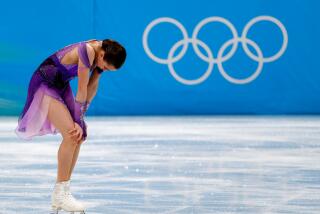Jones Quiet After Test Reports
- Share via
A day after leaving a track meet in Switzerland amid reports that she had failed a drug test, American track star Marion Jones remained silent Saturday.
Jones told organizers of the meet that she was withdrawing for personal reasons, but sources told several news outlets Friday that Jones tested positive for the synthetic blood doping product erythropoietin, or EPO, at the U.S. nationals in Indianapolis last June.
Jones, 30, from Thousand Oaks, won the 100-meter race and seemed to be rejuvenating a career that had been dogged by drug rumors ever since she won three gold medals and two bronzes at the 2000 Olympics.
United States track officials were refraining from comment until both of Jones’ drug samples have been tested. The results disclosed Friday were from her “A” sample. A second test will be conducted on her “B” sample within the next few weeks.
Neither Jones’ agent, Charlie Wells, nor her attorney, Rich Nichols, returned messages Saturday, though Nichols released a statement Friday saying Jones was not using drugs.
Victor Conte, founder of BALCO, the Bay Area lab under investigation for distributing steroids and other banned substances, said in a 2004 television interview that he had watched Jones inject herself with steroids. He released an e-mail Saturday about Jones.
“I have always told the truth regarding my relationship with Marion Jones,” the e-mail said.
Steve Riddick, Jones’ coach, told Reuters on Saturday that he had received a text message from Jones. “She said I have some traces of EPO,” Riddick said. “I started laughing but she said she was serious.” Riddick also told Reuters, “I would stake my life on it she did not take EPO.”
Steve Ungerleider, an Oregon researcher who wrote “Faust’s Gold,” a book on East Germany’s sports doping machine, said that although he found it curious that Jones would test positive for a drug more closely associated with endurance athletes such as cyclists and cross-country skiers, he was also surprised Riddick would be so adamant.
“That’s a pretty bizarre thing to say,” Ungerleider said. “There have been a handful of cases where the ‘B’ sample came back negative but usually when you’ve got a positive ‘A’ sample, you’ve got a positive ‘B.’ I don’t think I’d be willing to put my life or my professional credentials on the line in that way.”
*
Times staff writer Alan Abrahamson contributed to this report.
More to Read
Go beyond the scoreboard
Get the latest on L.A.'s teams in the daily Sports Report newsletter.
You may occasionally receive promotional content from the Los Angeles Times.







